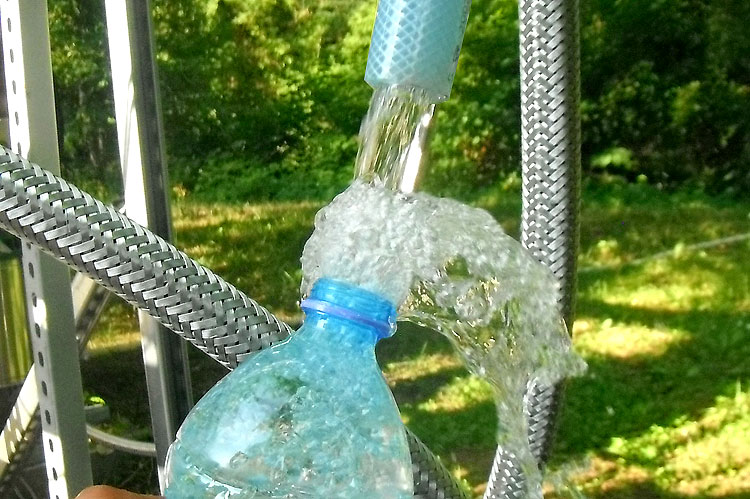Linaë® PURE - Desalinisation of seawater or brackish water
To answer safe drinking water needs of people living close to the sea, the Linaë® PURE range offers units of seawater desalination based on the principle of reverse osmosis.

The desalination treatment of seawater
Reverse osmosis is a membrane technique for the separation of the water and its solutes (ions, aqueous salt, pesticides, herbicides, pathogens, drugs, etc.) by passing through a semi-selective membrane under the effect of high pressure. The water treated is separated: one part uncharged – the permeate – and one charged in impurity -the concentrate.

Reverse osmosis is the main treatment for desalination of sea water, but alone, this principle can not provide drinking water. This is why pre-and post-treatments are needed.
Pre-treatments
Water to desalt is preliminarily analyzed. This analysis allows to determine the pre-treatment required to prevent fouling and clogging of the reverse osmosis membranes due to elements present in the water to be desalinated: suspended solids, microorganisms, colloids, partially insoluble salts, chlorine, calcium, metal oxides, etc.
The pre-treatments which are incorporated to Linaë® Pure units are:
- a chain of decreasing particle filter: removal of solid particles such as sand, earth;
- an activated carbon adsorpsion: chemical and organic decontamination, removal of taste and odor;
- a biocide treatment with UV lamp: elimination of bacteria, germs and pathogens.
They may be supplemented by other pre-treatments rendered necessary by the characteristics of the water to be desalinated:
- a coagulation / flocculation / sedimentation: removal of colloidal particles, microalgae;
- an injection of anti-limescale agent: scaling prevention
- etc.
Post-treatments
The post-treatments aim to make consumable the water obtained at the outlet of membranes.
The post-treatments which are incorporated to Linaë® Pure units are:
- mineralization: water produced by reverse osmosis is perfectly pure and free from its salts. Therefore, it is unsuitable for consumption and should be re-mineralized. This operation is performed by percolation through a mineral rich in calcium and magnesium.
- the addition of chlorine through a metering pump: this residual disinfection enables the storage of the water for a long time in flexible or rigid containers.

